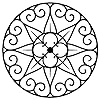Meg
asked
C.E. McGill:
In the author's note of Our Hideous Progeny, you share that you originally felt the idea for the story was "ridiculous" and "the stupidest idea I'd ever had." My question is this: How do you push past the doubts about your ideas and write them anyway? And how do you manage to carry the spark of an idea into a finished, flowing plot, from beginning to end?
C.E. McGill
Ha, great question! Even though it may feel a little bit like cheating, I find that one surefire way to push past my own doubts about a project and find motivation to write is to talk about my ideas with others. As you point out, when I first came up with the idea for OHP, I thought it was ridiculous - but when I jokingly mentioned the idea at Thanksgiving dinner, my family loved it and demanded to see it played out. Given that little boost of self-confidence, I ended up considering the idea more seriously and realizing that there was actually far more depth and possibility in this "Frankenstein with dinosaurs" concept than I'd initially given it credit for. I find that having a trusted friend or family member or classmate or critique group to brainstorm with (and to demand to see that first chapter written out!) helps me realize, through their reaction to it, what actually drew me to the idea in the first place and why it's worth pursuing. In other words: if you haven't got any self-confidence at home yet, store bought is fine.
As to carrying that spark through to a finished plot, that's a process that I've still yet to master, and I doubt I ever will! Gene Wolfe apparently once said to Neil Gaiman, "You never learn how to write a novel. You just learn how to write the novel you're on." At the beginning, every one of my novels is simply a collection of Vibes and pivotal scenes stuck in my head, which I then spend several months trying to wrangle into some sort of structure. As much as I love things like the Hero's Journey or the 3-act structure or the MICE quotient in theory, I tend to write in a much more character-based fashion - make a character who Needs Something (whether that be money, love, respect, revenge, or a swift kick in the pants) and then set them loose upon the world and see what they do. In the end, of course, the most important thing is getting that messy, imperfect first draft on paper - because then, with each cycle of editing, you can start bringing it closer and closer to what you always imagined that first spark of a story to be.
Hope that helps - and best of luck! :)
As to carrying that spark through to a finished plot, that's a process that I've still yet to master, and I doubt I ever will! Gene Wolfe apparently once said to Neil Gaiman, "You never learn how to write a novel. You just learn how to write the novel you're on." At the beginning, every one of my novels is simply a collection of Vibes and pivotal scenes stuck in my head, which I then spend several months trying to wrangle into some sort of structure. As much as I love things like the Hero's Journey or the 3-act structure or the MICE quotient in theory, I tend to write in a much more character-based fashion - make a character who Needs Something (whether that be money, love, respect, revenge, or a swift kick in the pants) and then set them loose upon the world and see what they do. In the end, of course, the most important thing is getting that messy, imperfect first draft on paper - because then, with each cycle of editing, you can start bringing it closer and closer to what you always imagined that first spark of a story to be.
Hope that helps - and best of luck! :)
More Answered Questions
About Goodreads Q&A
Ask and answer questions about books!
You can pose questions to the Goodreads community with Reader Q&A, or ask your favorite author a question with Ask the Author.
See Featured Authors Answering Questions
Learn more



